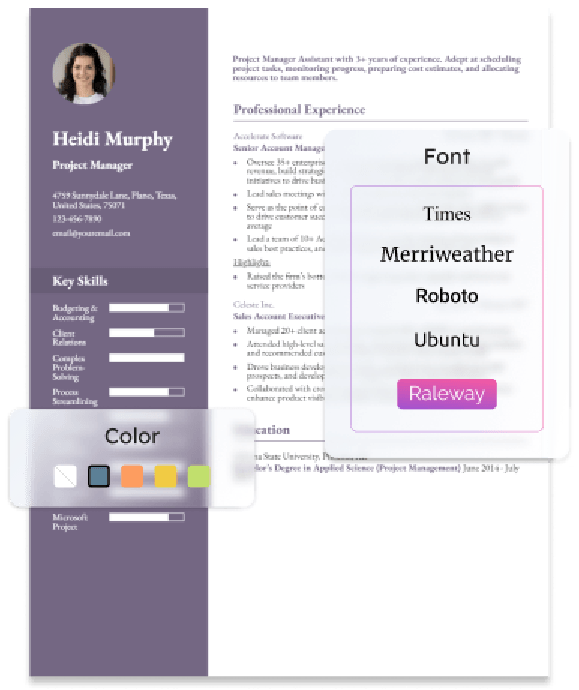To generate interviews for chief information officer (CIO) jobs, you must craft a results-driven resume that encapsulates the strongest aspects of your professional career, from information technology (IT) management to cloud computing. This is an executive-level manager role within the computer information system field, so you’ll encounter strong competition while applying for roles on the open market. To grab the attention of prospective employers, you’ll need to showcase your subject matter expertise and leadership capabilities prominently on your resume. This guide provides expert tips to help you tell your story and achieve your career goals.
Most Popular Chief Information Officer Resumes
Chief Information Officer Resume
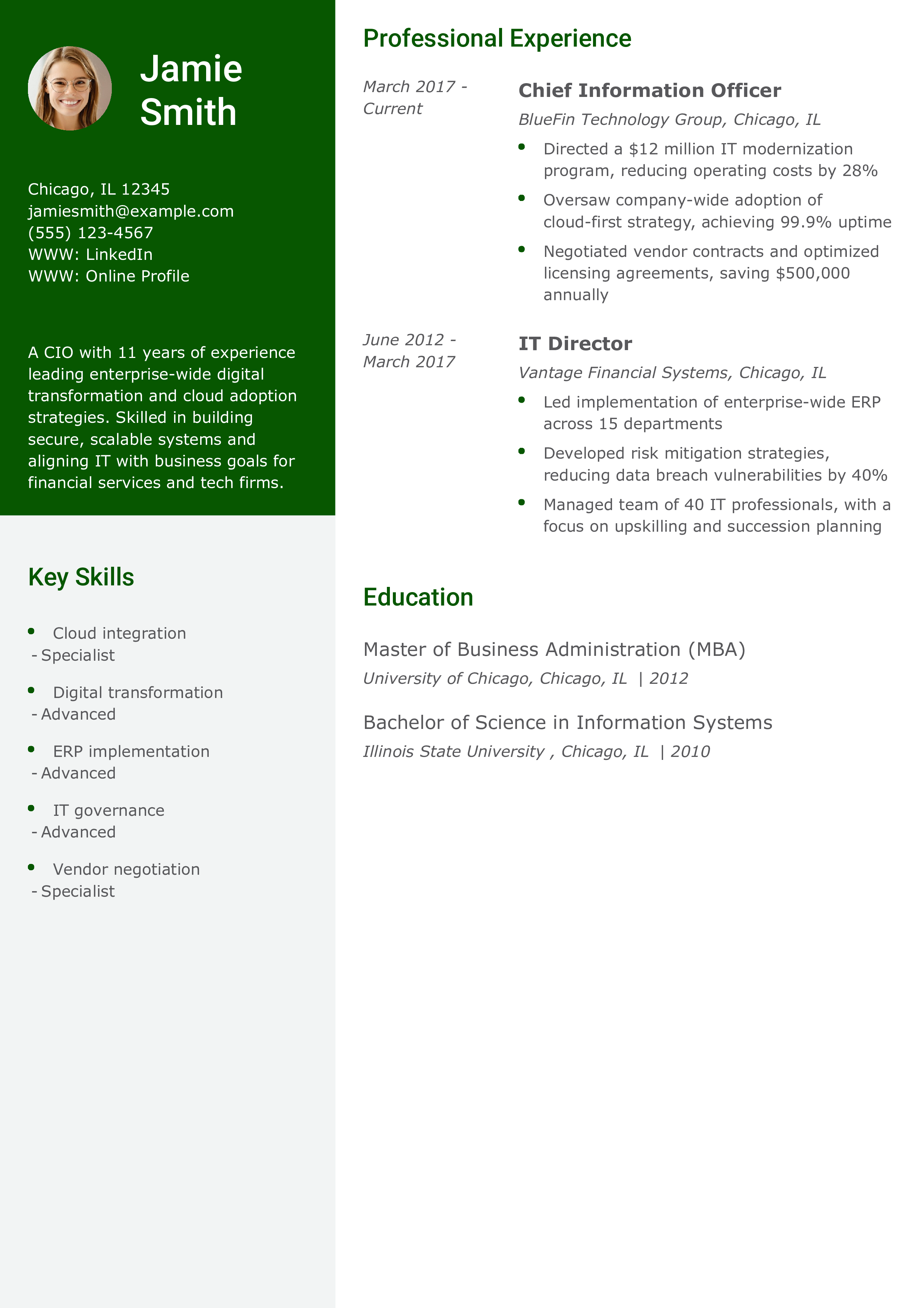
Why This Resume Is Strong
This resume effectively shows strategic leadership in IT modernization and quantifies success through cost savings and uptime improvements. For more advice on tailoring your resume, visit How To Make a Resume.
Chief Information Security Officer Resume
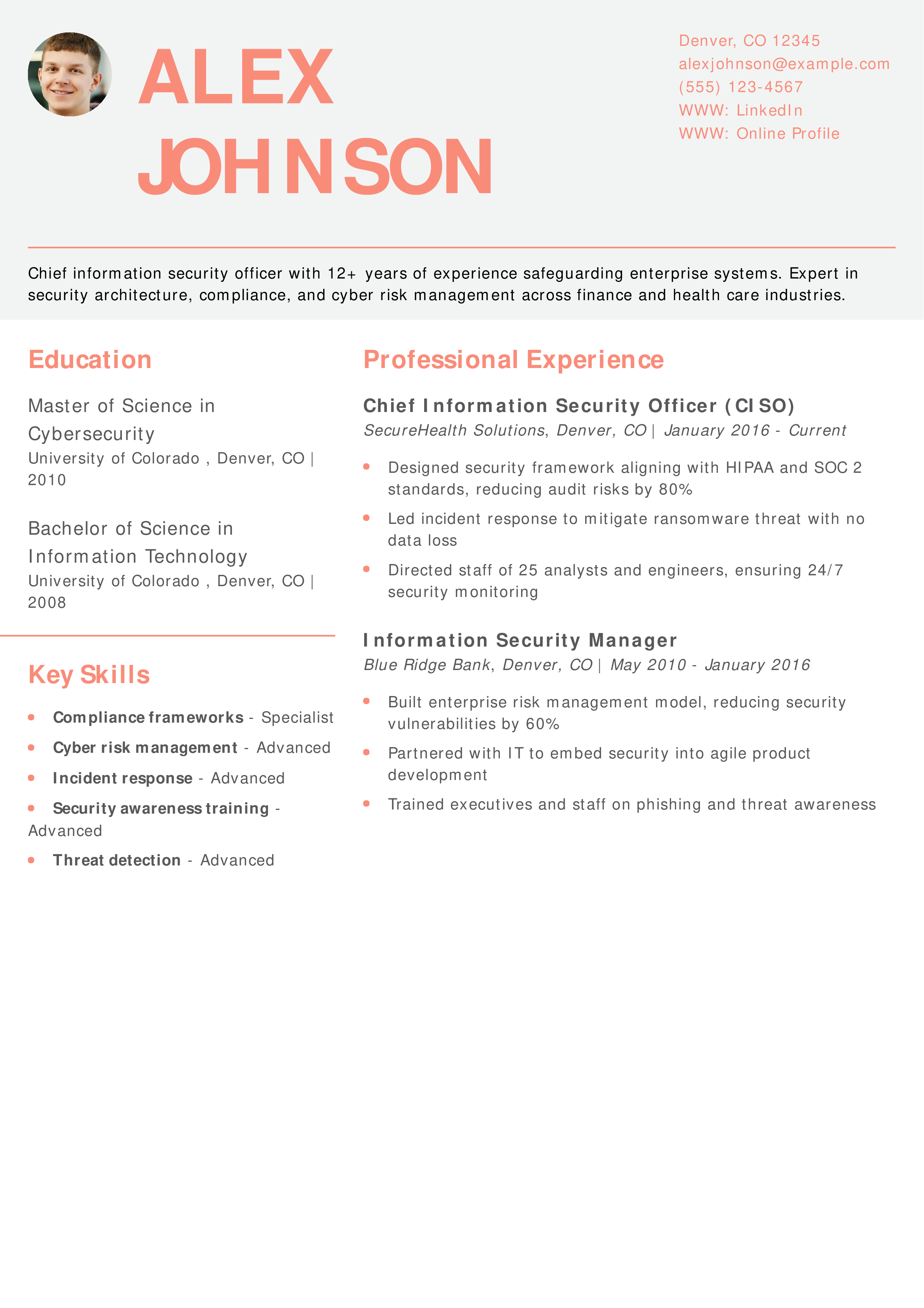
Why This Resume Is Strong
This resume succeeds by presenting a security-focused executive profile supported by risk reduction metrics. Learn how to strengthen your resume summary at Resume Summary Examples.
Chief Technology Officer Resume
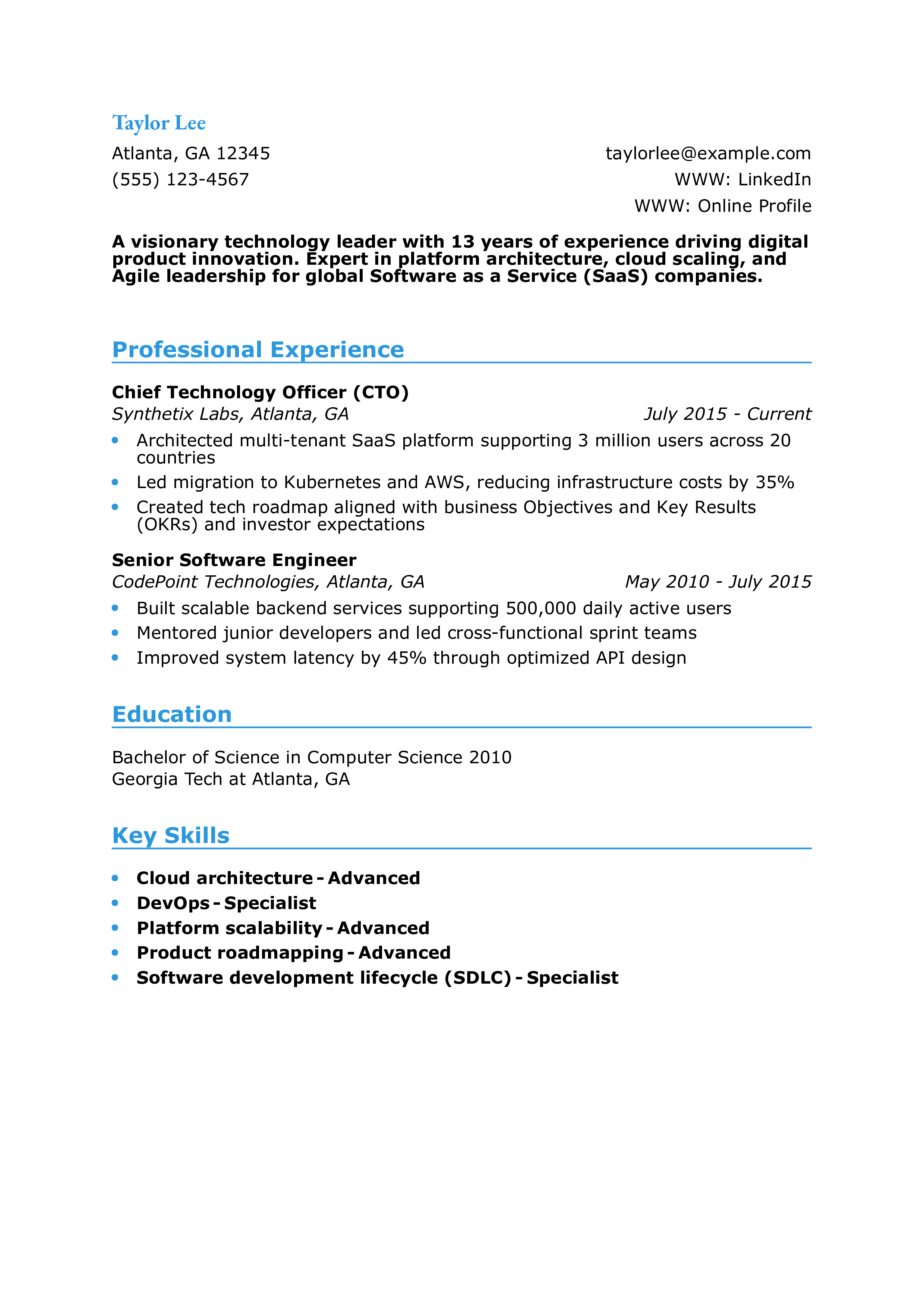
Why This Resume Is Strong
This resume showcases deep technical expertise with business alignment. For more guidance on layout and flow, visit Best Resume Formats.
IT Help Desk Manager Resume
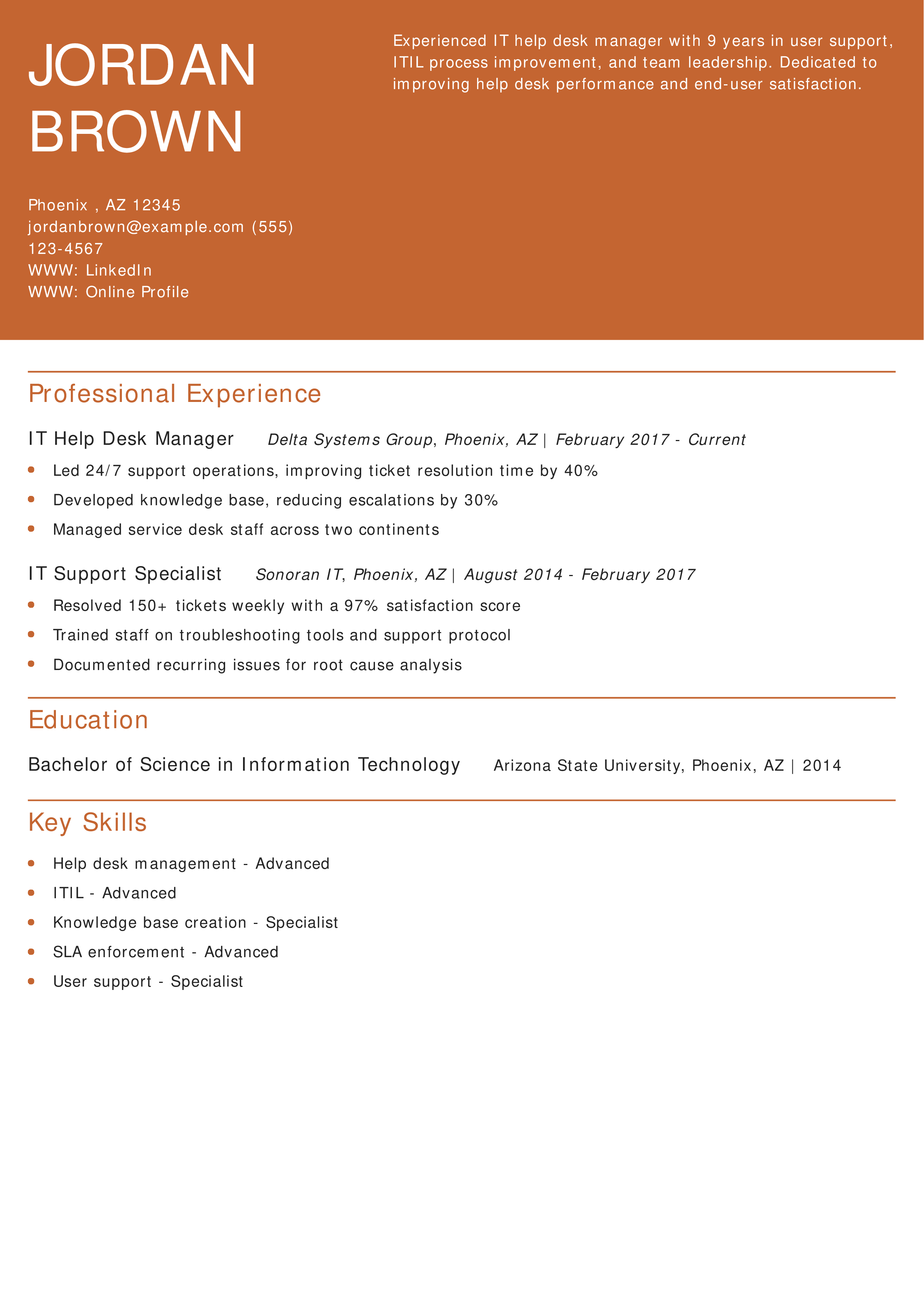
Why This Resume Is Strong
This resume demonstrates leadership in user support and effective performance improvements. Learn how font choices improve clarity at Best Font for a Resume.
Information Technology Director Resume
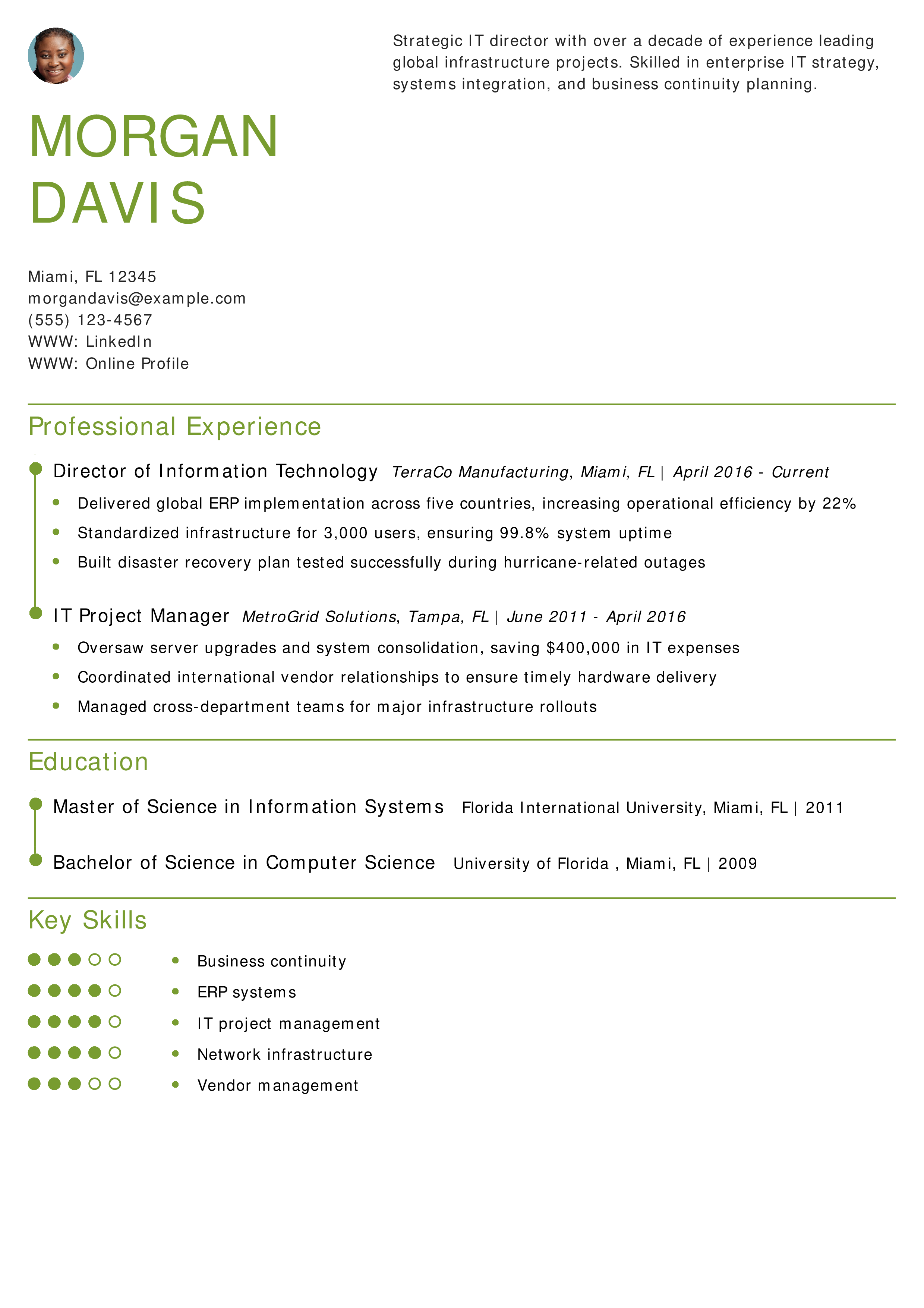
Why This Resume Is Strong
This resume presents a strong blend of leadership and crisis management. For more insight on what to include in a resume, visit What To Put on a Resume.
Vice President of Information Technology Resume
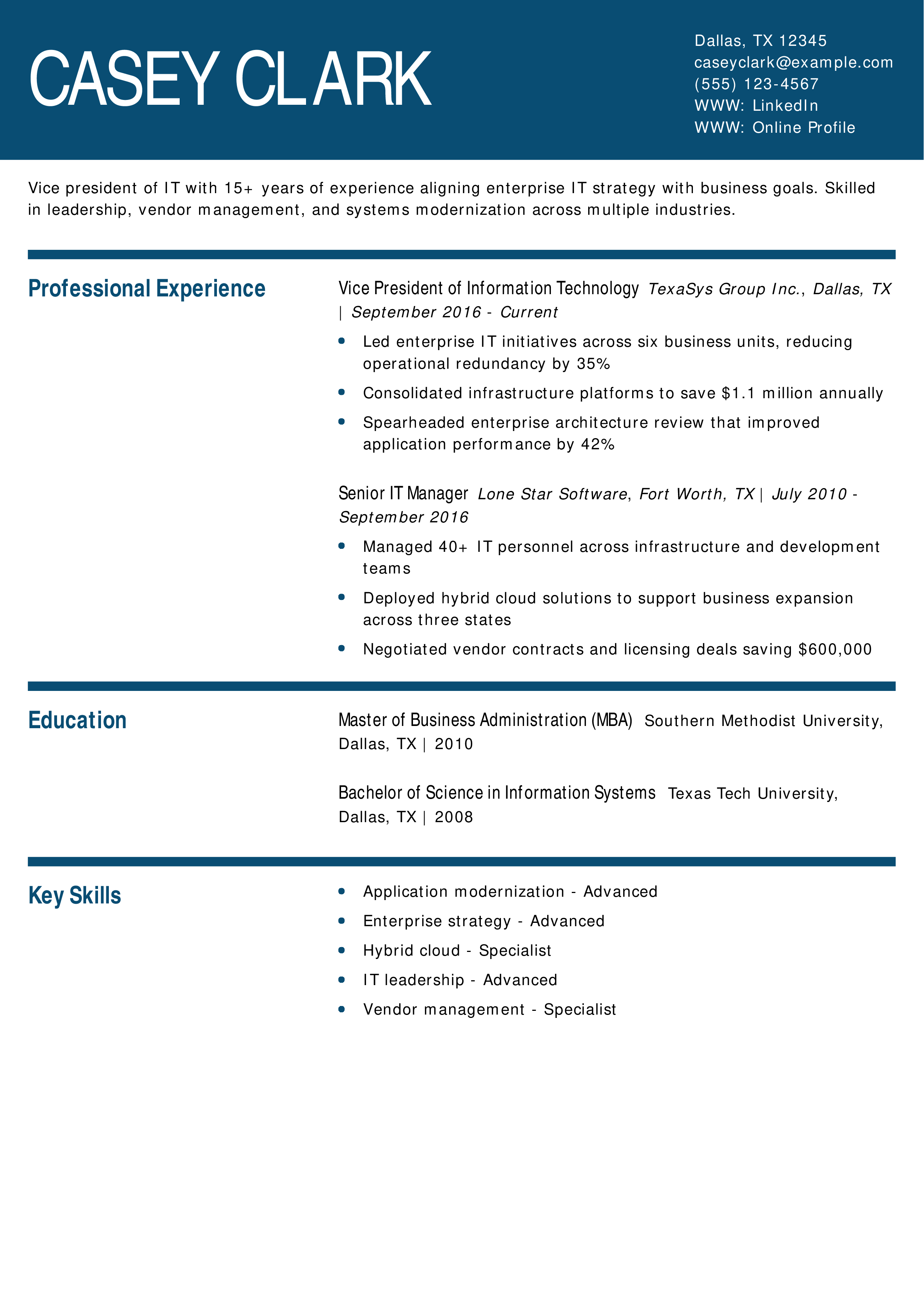
Why This Resume Is Strong
This resume reflects high-level decision-making, measurable achievements, and multi-department leadership. For additional help creating a standout leadership resume, explore Resume Outline Examples.
Information Systems Director Resume
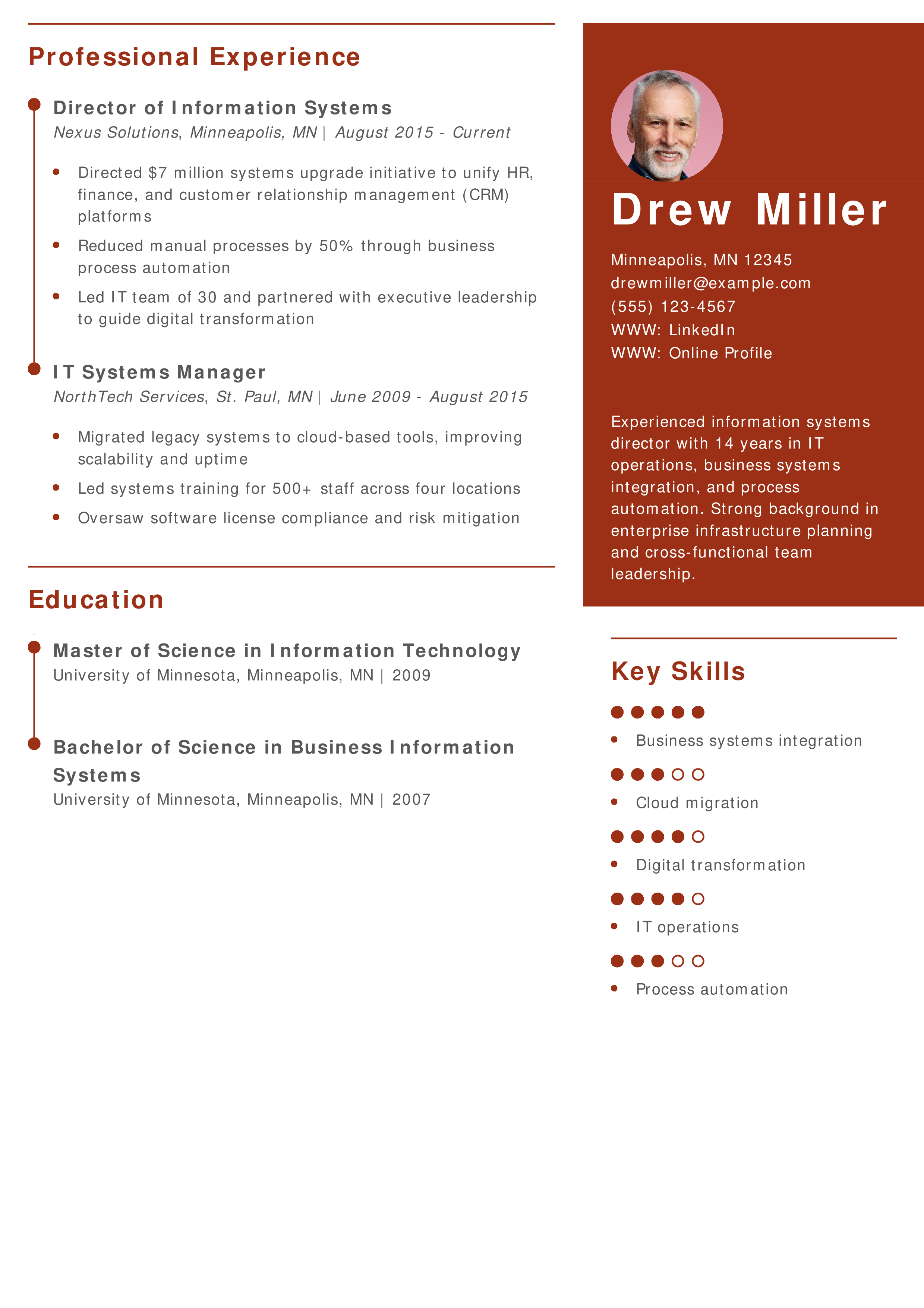
Why This Resume Is Strong
This resume works because it balances technical detail with strategic business value. Learn how to present both tech and leadership skills clearly at Technical Skills for a Resume.
Enterprise Infrastructure Manager Resume
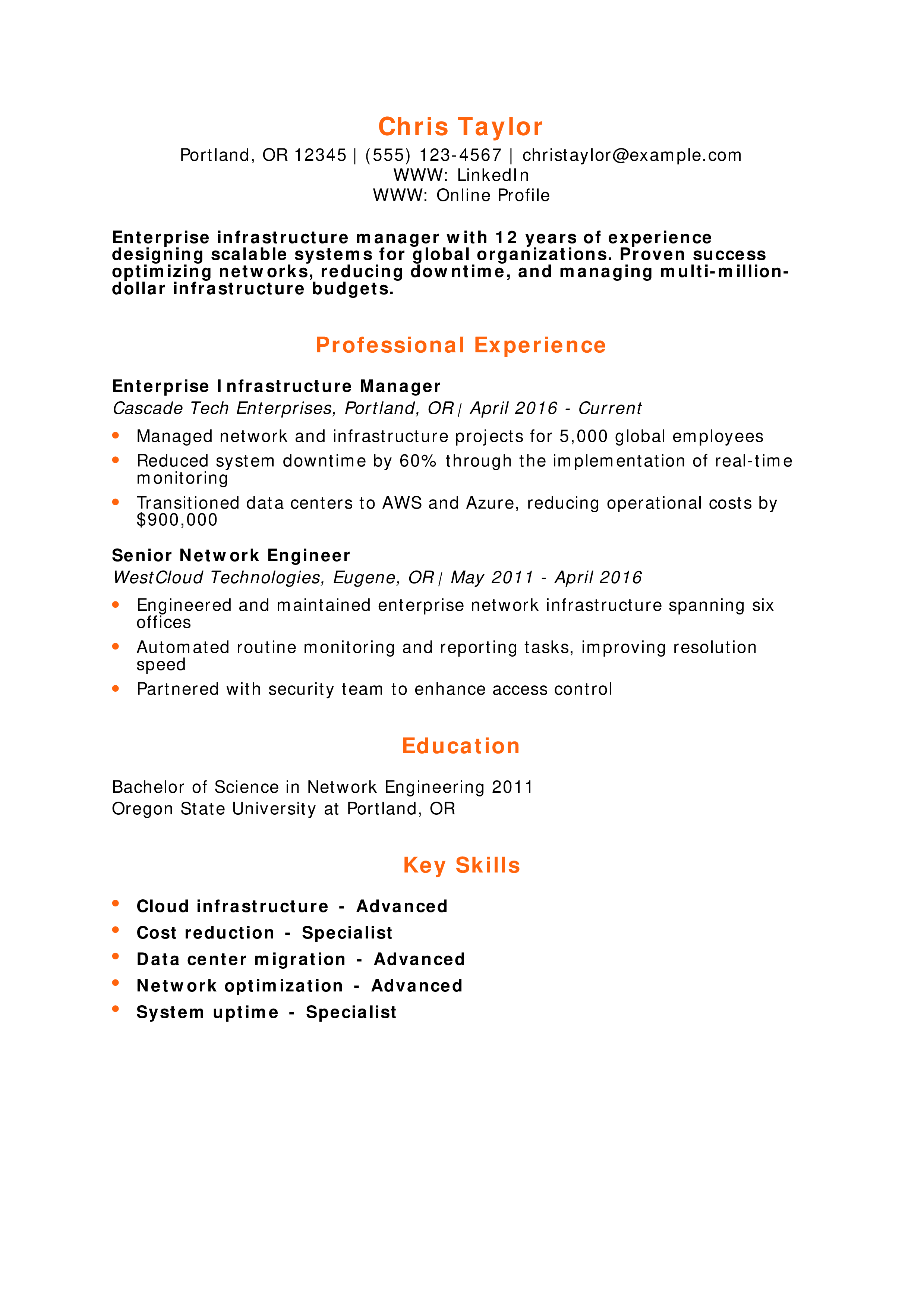
Why This Resume Is Strong
This resume is strong because it emphasizes measurable infrastructure performance gains. Discover how to highlight technical achievements at How To List Certifications on a Resume.
Director of IT Security Resume
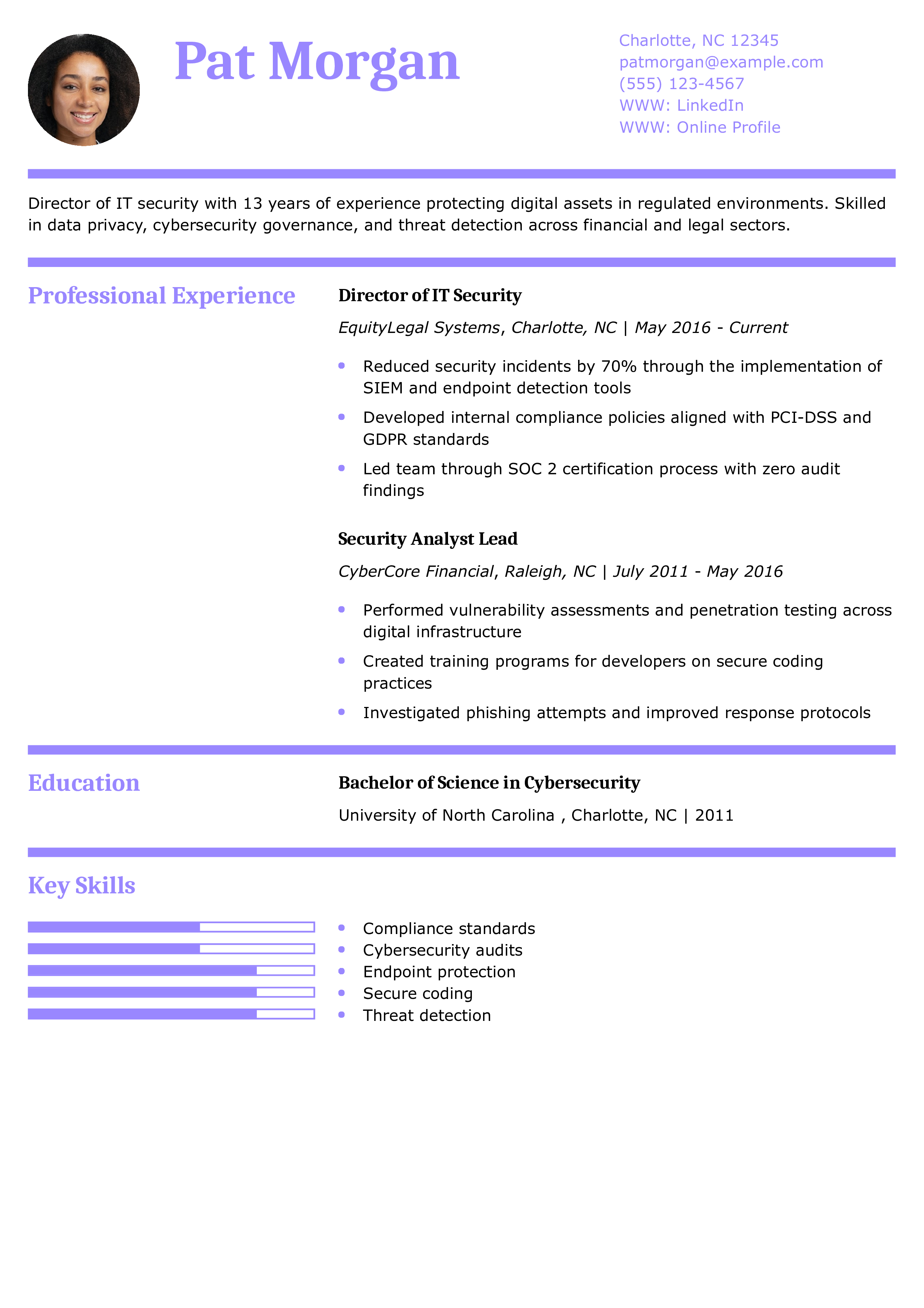
Why This Resume Is Strong
This resume stands out because it focuses on audit readiness and quantifiable risk reductions. For more ideas on listing security skills, visit Soft Skills for a Resume.
IT Program Manager Resume
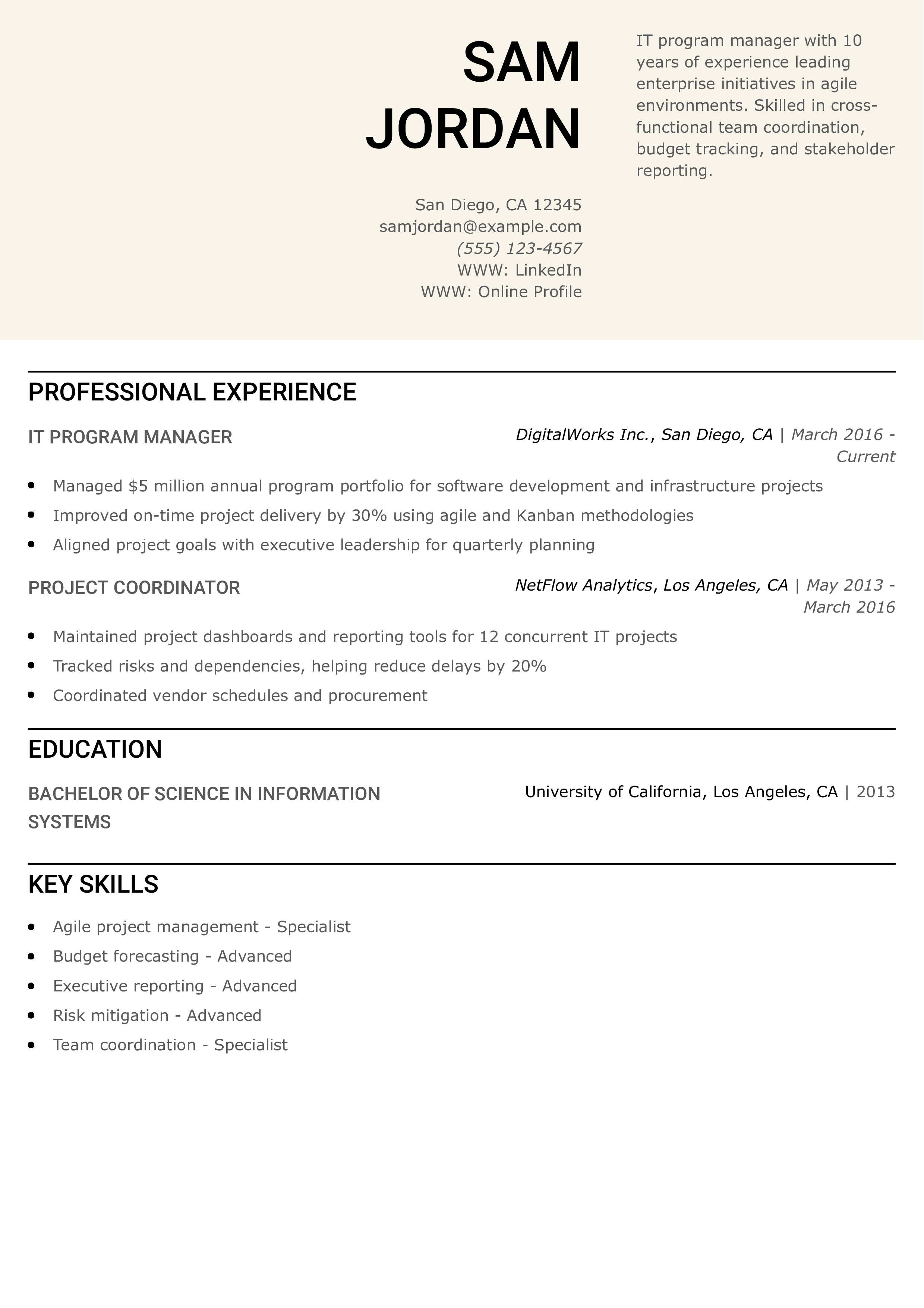
Why This Resume Is Strong
This resume is effective because it clearly communicates program outcomes and leadership in agile execution. To improve your resume’s organization, check out Should a Resume Be One Page?
IT Compliance Manager Resume
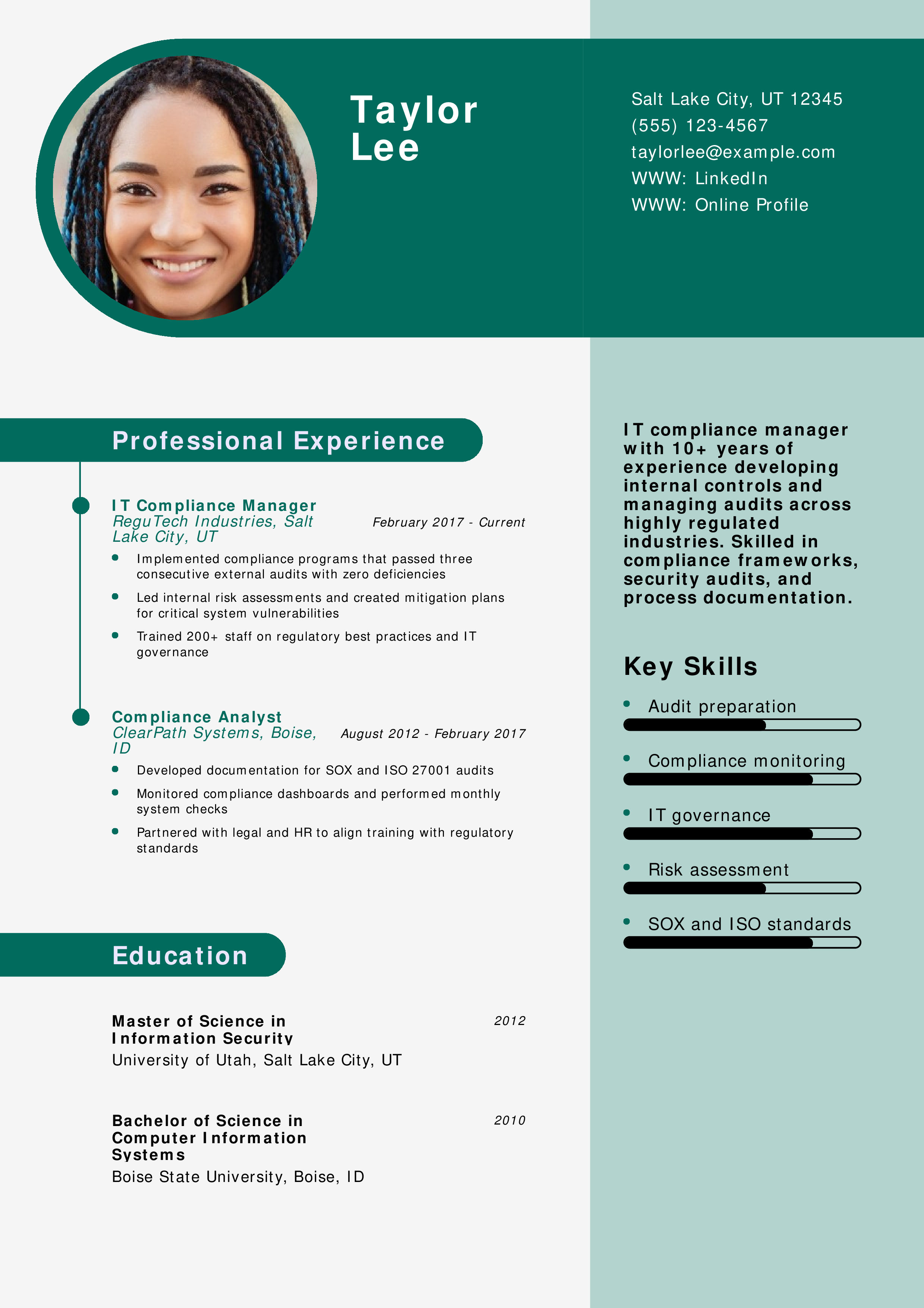
Why This Resume Is Strong
This resume highlights the candidate’s proven track record in regulatory environments and audit success. Learn more about listing certifications and compliance frameworks at How To List Certifications on a Resume.
IT Service Delivery Manager Resume
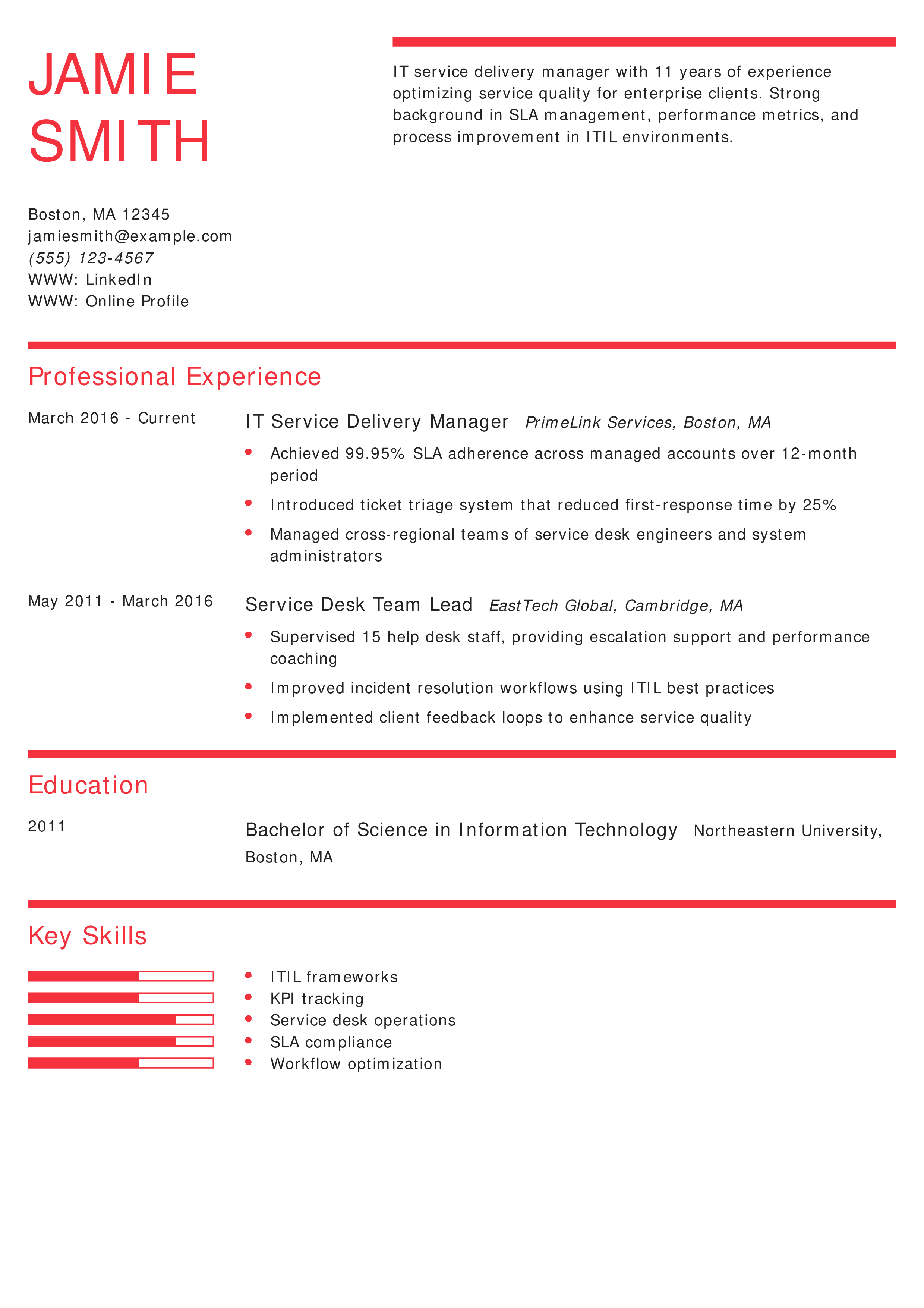
Why This Resume Is Strong
This resume effectively combines technical performance with service leadership. Discover how to balance soft and technical skills at Resume Skills.
Chief Innovation Officer Resume
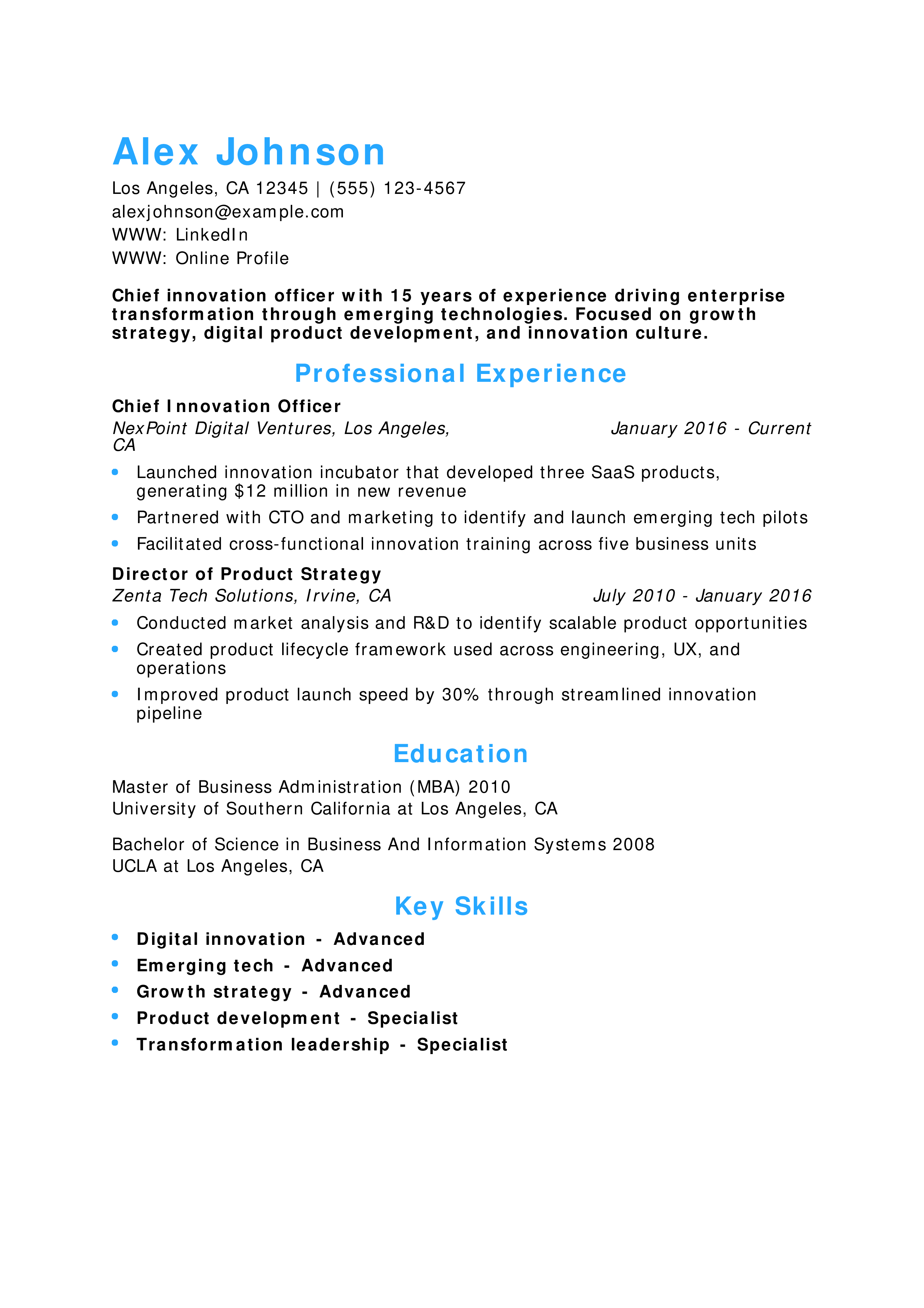
Why This Resume Is Strong
This resume is effective because it emphasizes entrepreneurial outcomes and innovation culture. For tips on adding creative sections to your resume, visit Resume Interests Section.
Digital Transformation Executive Resume
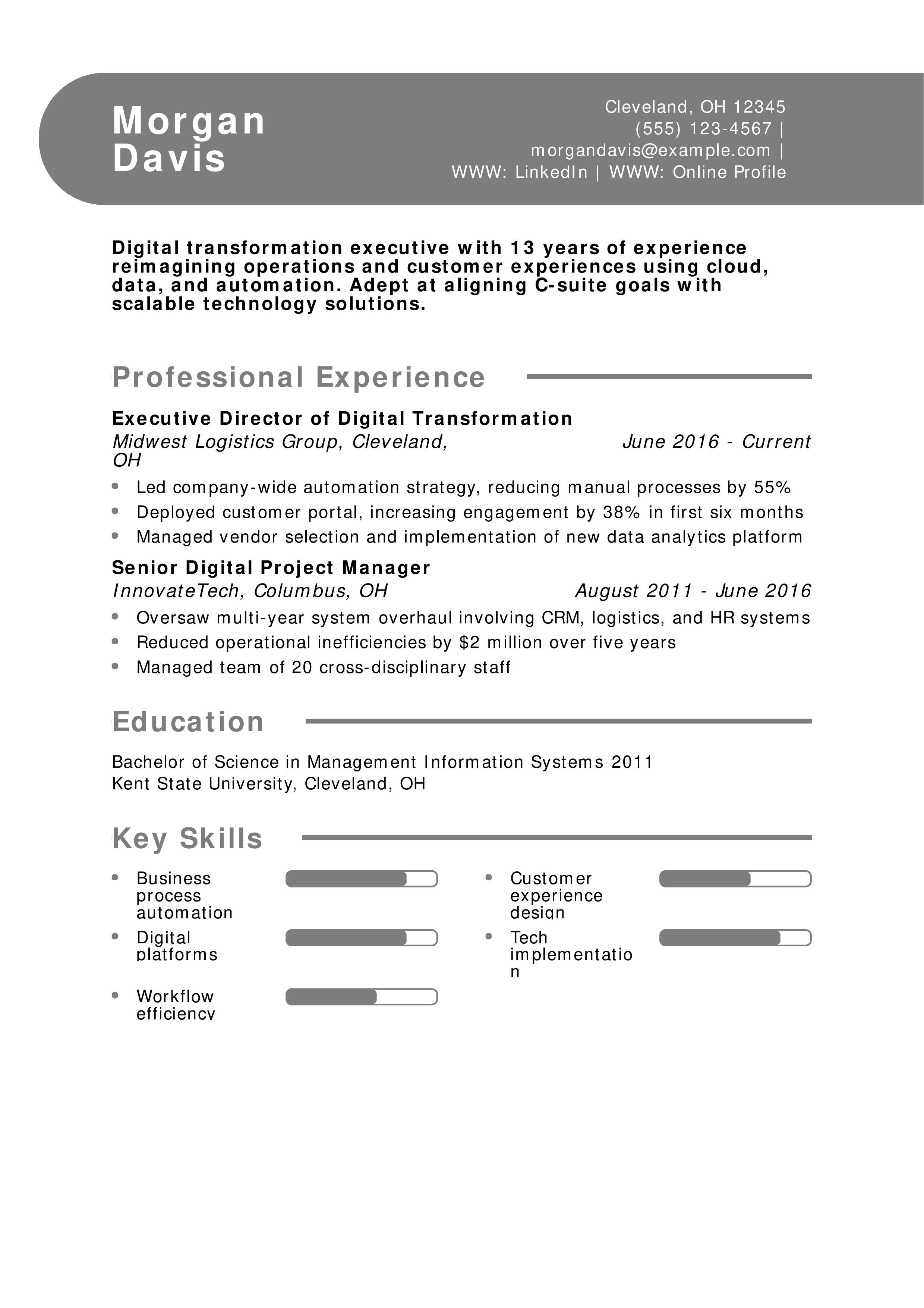
Why This Resume Is Strong
This resume works because it shows enterprise-level impact and focuses on measurable change. Learn how to present similar achievements in your resume by visiting How To Make a Resume.
Director of Data Governance Resume
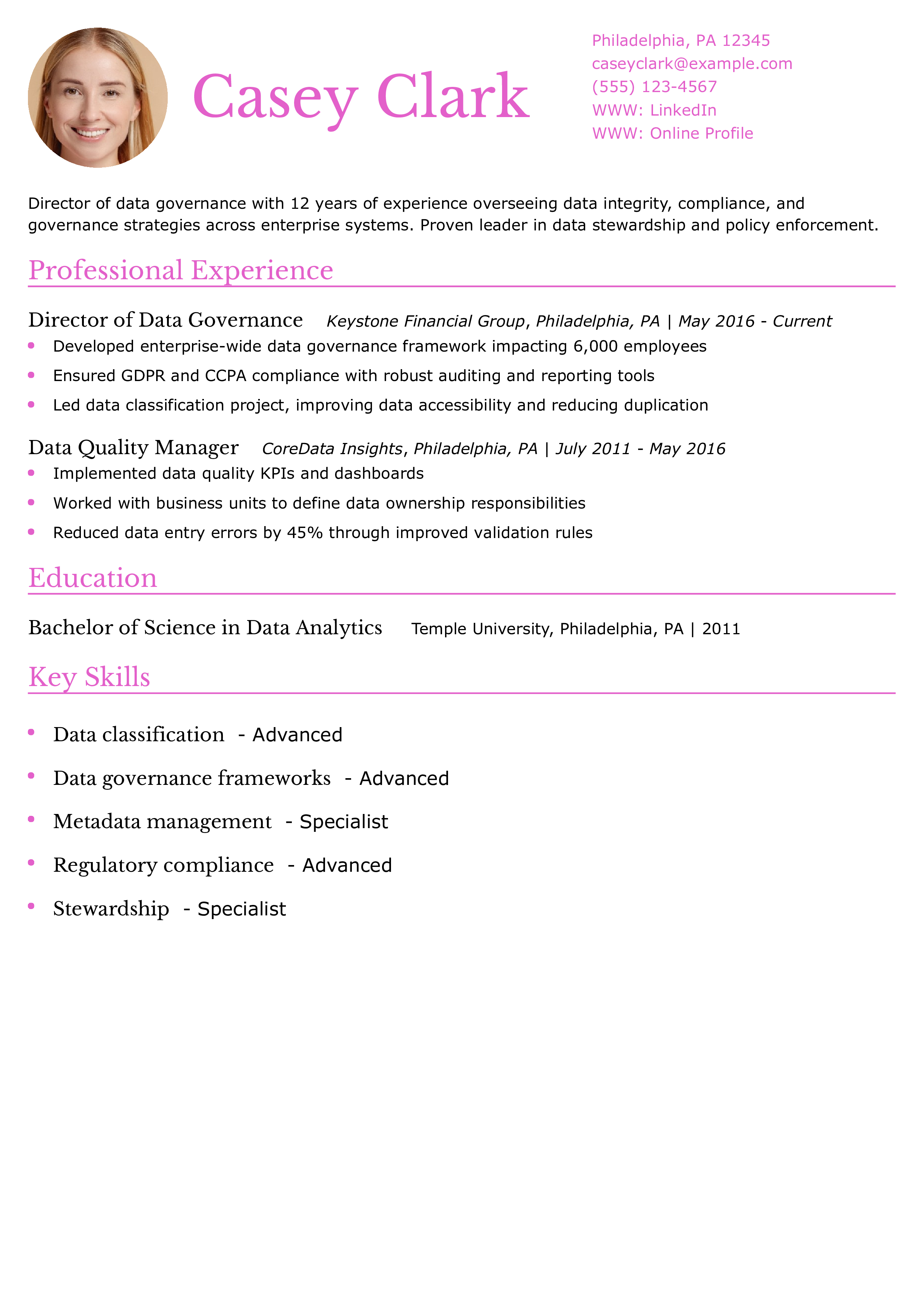
Why This Resume Is Strong
This resume highlights expertise in governance and compliance, areas critical for large enterprises. For more guidance on resume content, visit What To Put on a Resume.
Director of Cloud Operations Resume
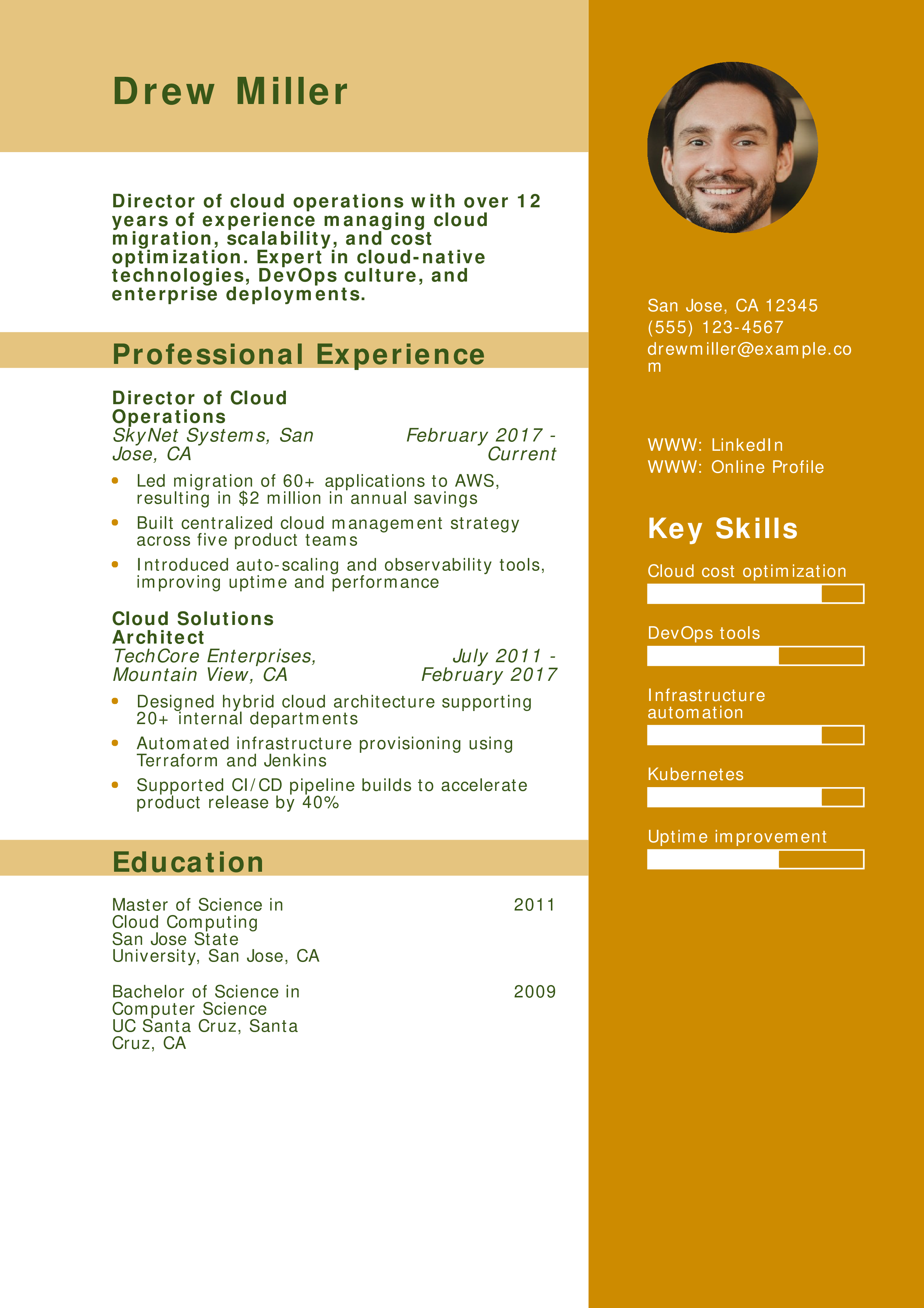
Why This Resume Is Strong
This resume highlights real-world cost savings, technical leadership, and automation experience. To learn more about formatting technical resumes, check out Technical Skills for a Resume.
Director of Enterprise Applications Resume
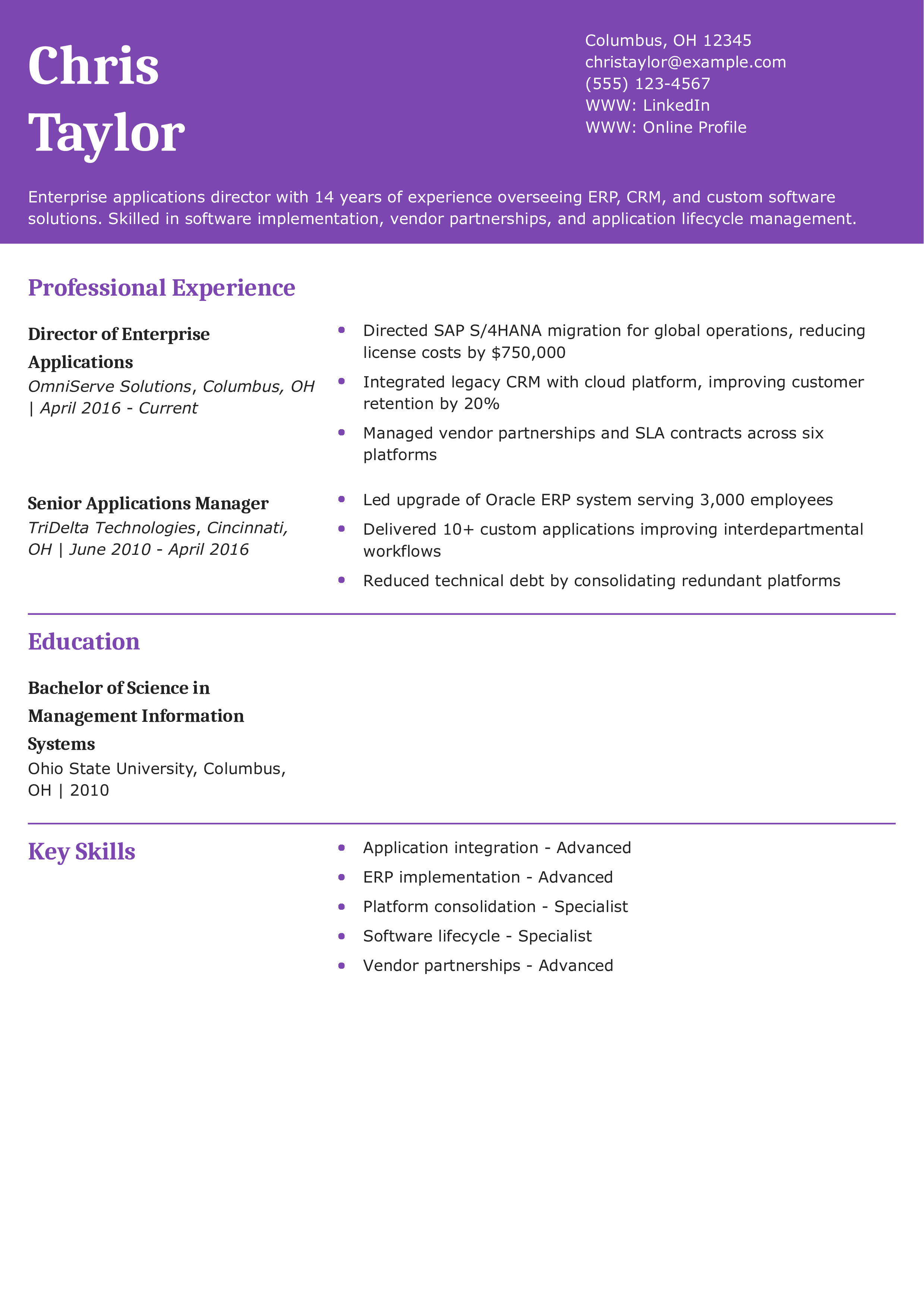
Why This Resume Is Strong
This resume is strong because it shows how enterprise-wide software management directly supports business goals. Learn more about structuring your resume content at Best Resume Formats.
Chief Digital Officer Resume
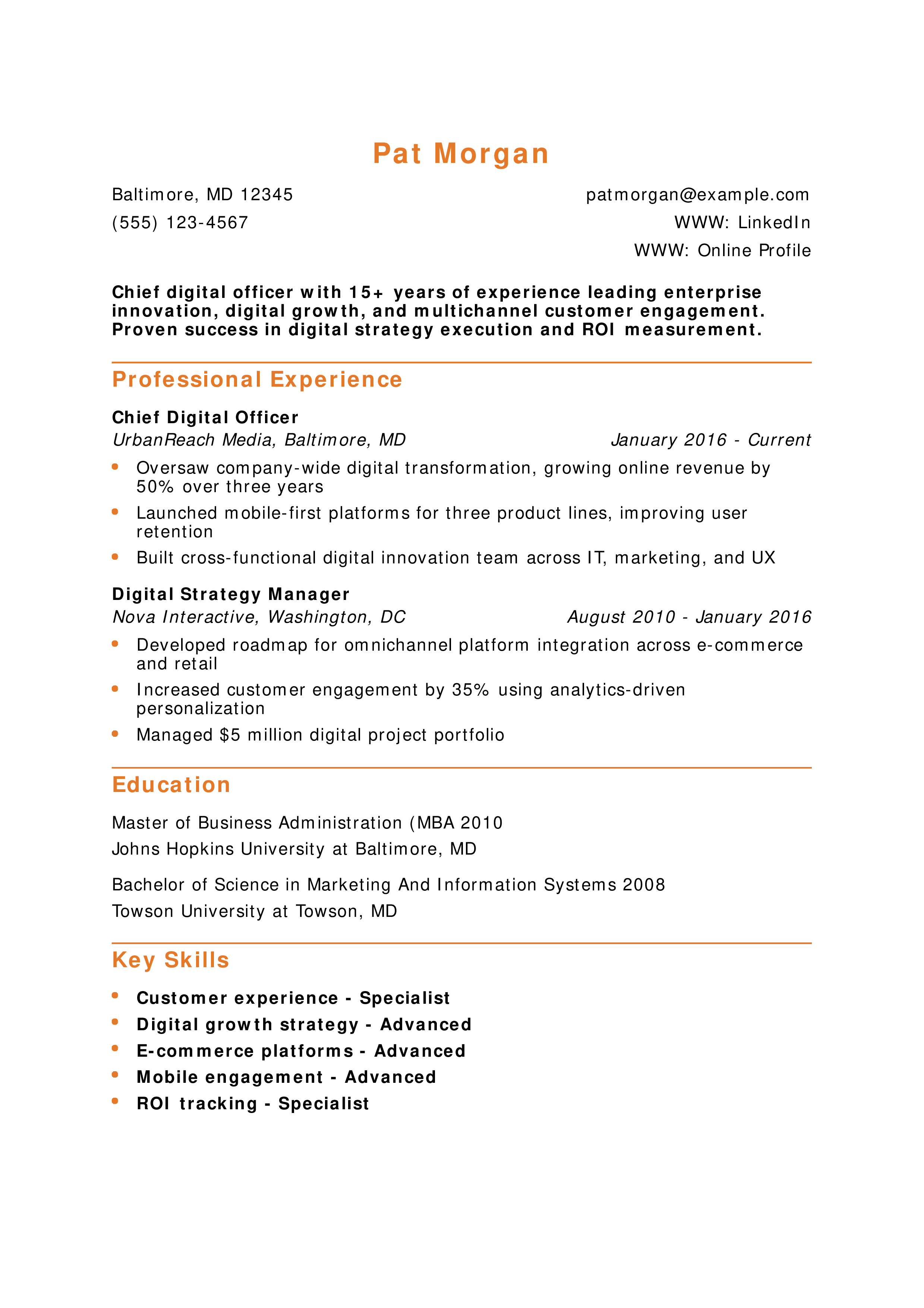
Why This Resume Is Strong
This resume shows how digital leadership translates into revenue and engagement metrics. Learn how to write powerful summaries and value statements at Resume Objective Examples.
Director of Business Intelligence Resume
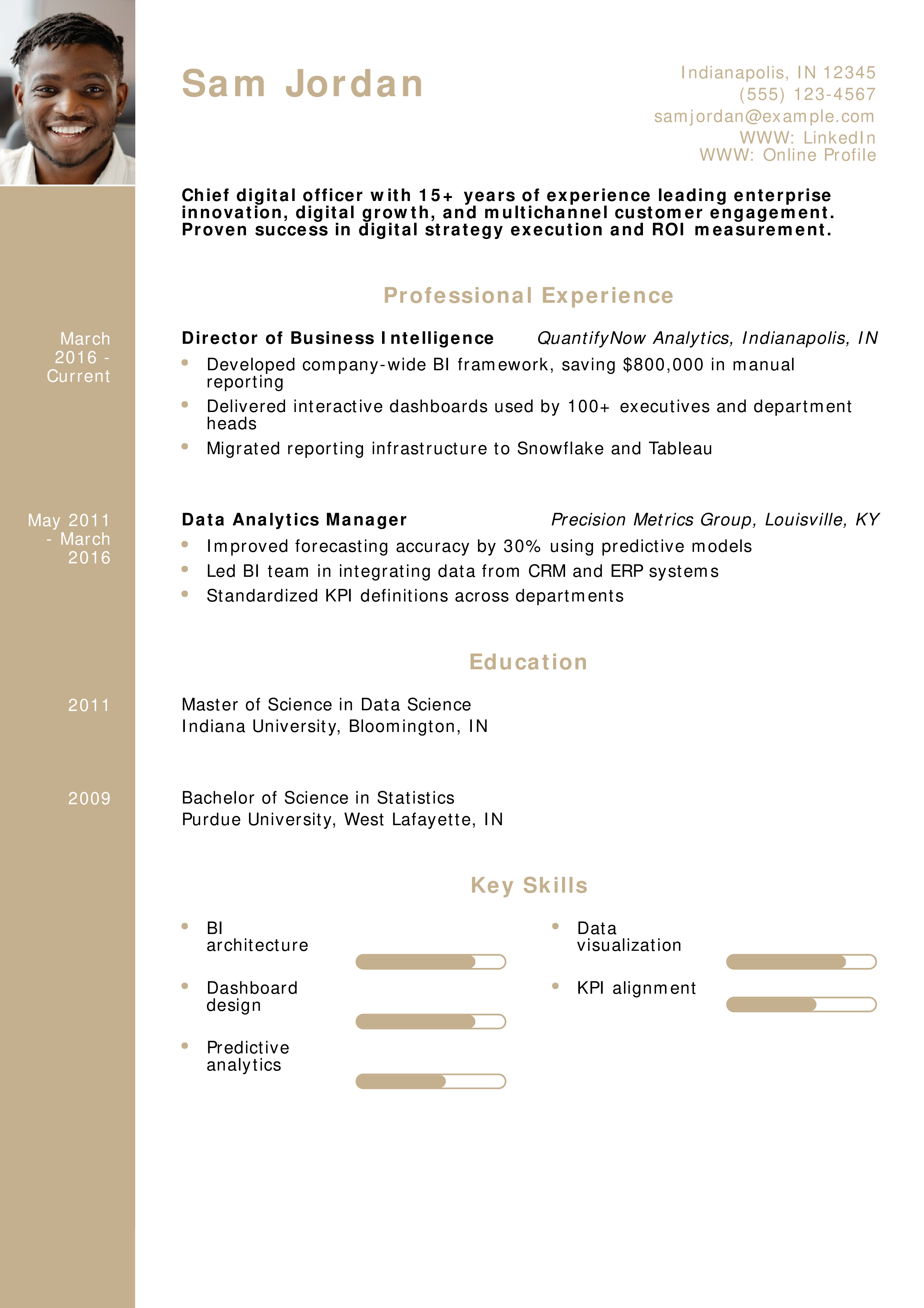
Why This Resume Is Strong
This resume works because it balances technical BI systems with business storytelling. For more resume tips on data-related roles, visit Resume Language Skills.
IT Risk Manager Resume
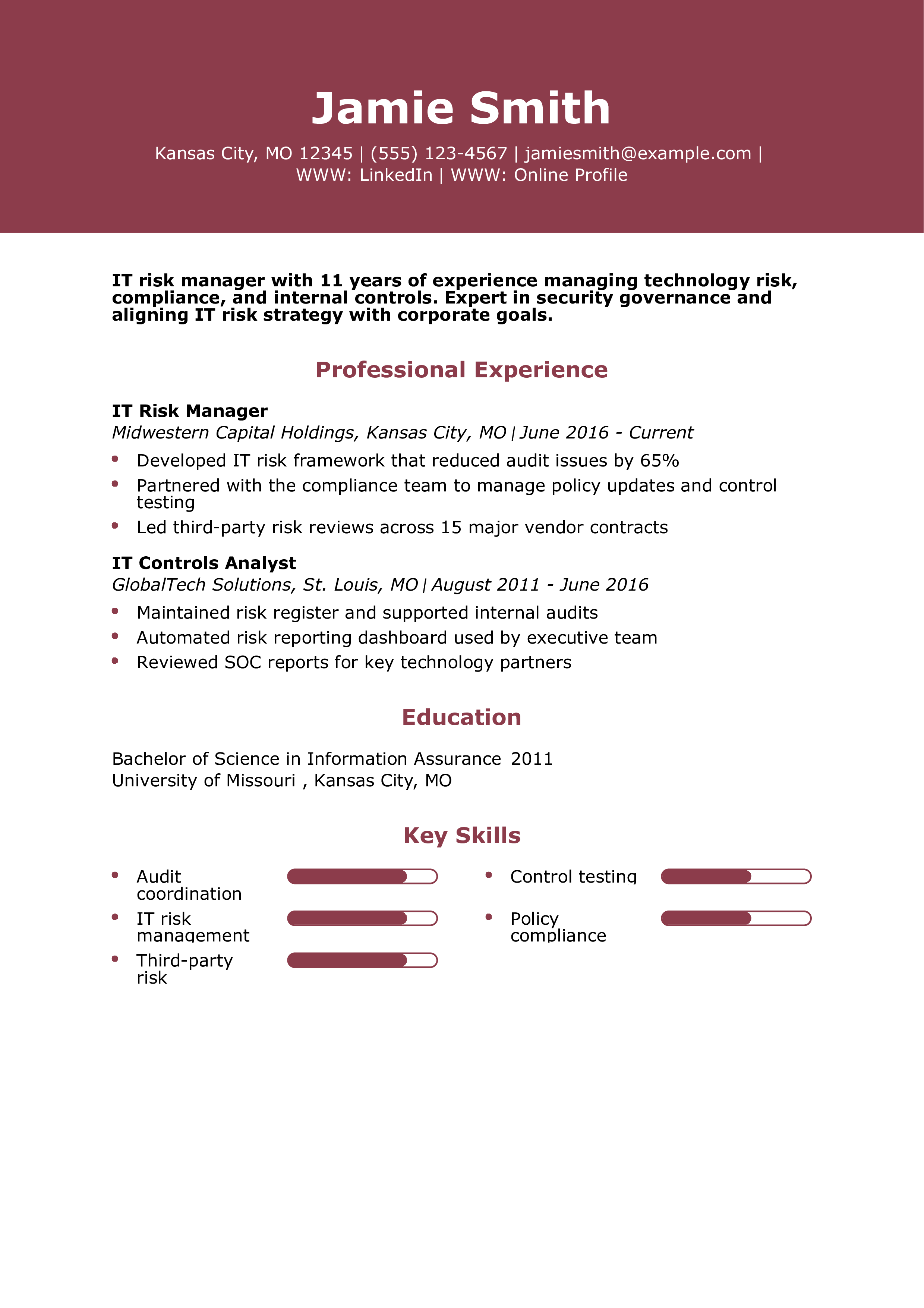
Why This Resume Is Strong
This resume is effective because it clearly shows how risk management efforts support business continuity and compliance. Learn how far back your work history should go at How Far Back Should a Resume Go?
Enterprise Solutions Architect Resume
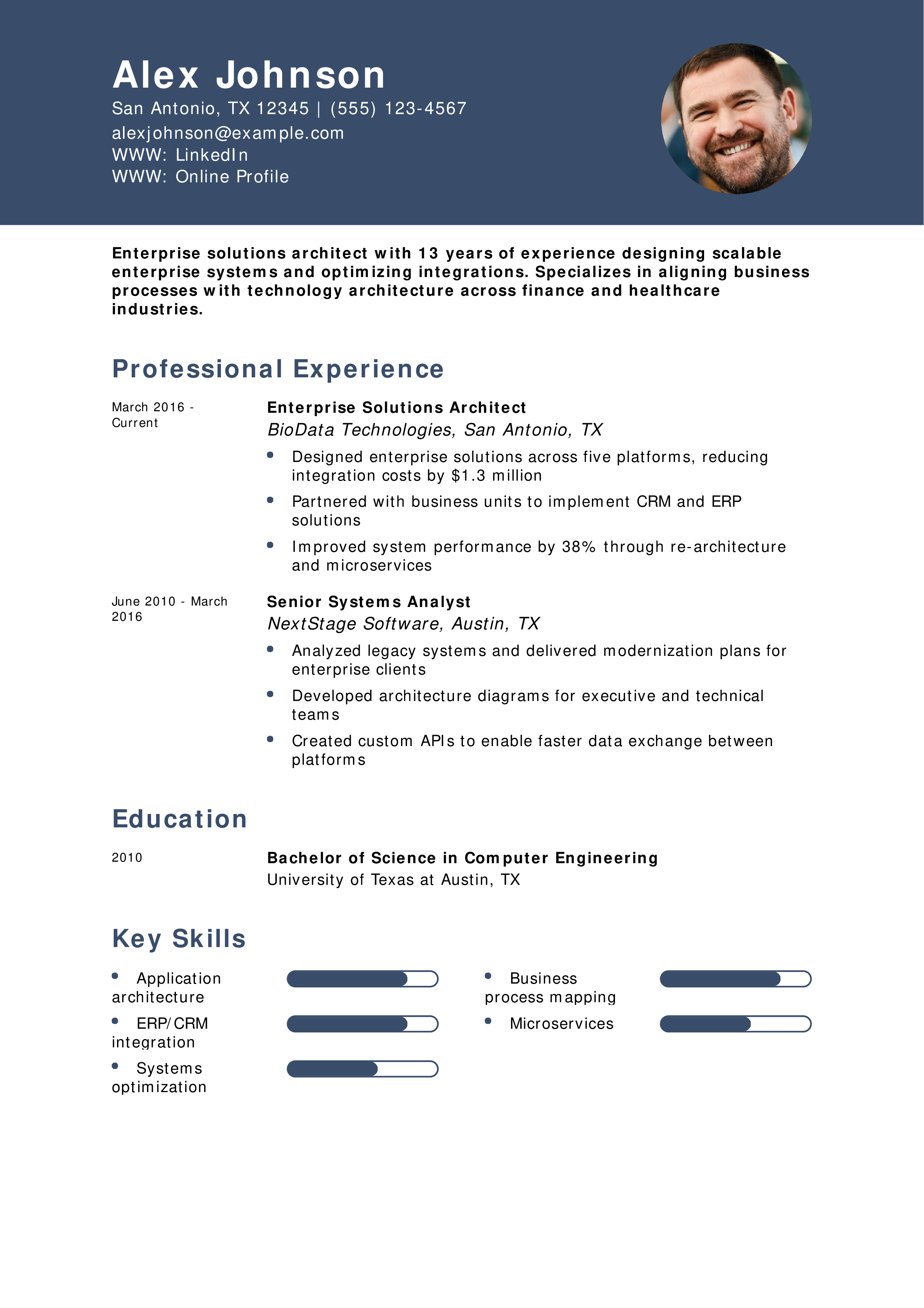
Why This Resume Is Strong
This resume is effective because it showcases long-term architectural impact and clear metrics tied to cost savings. For more on how to include software and platform experience, check out Resume Skills.
Technology Integration Director Resume
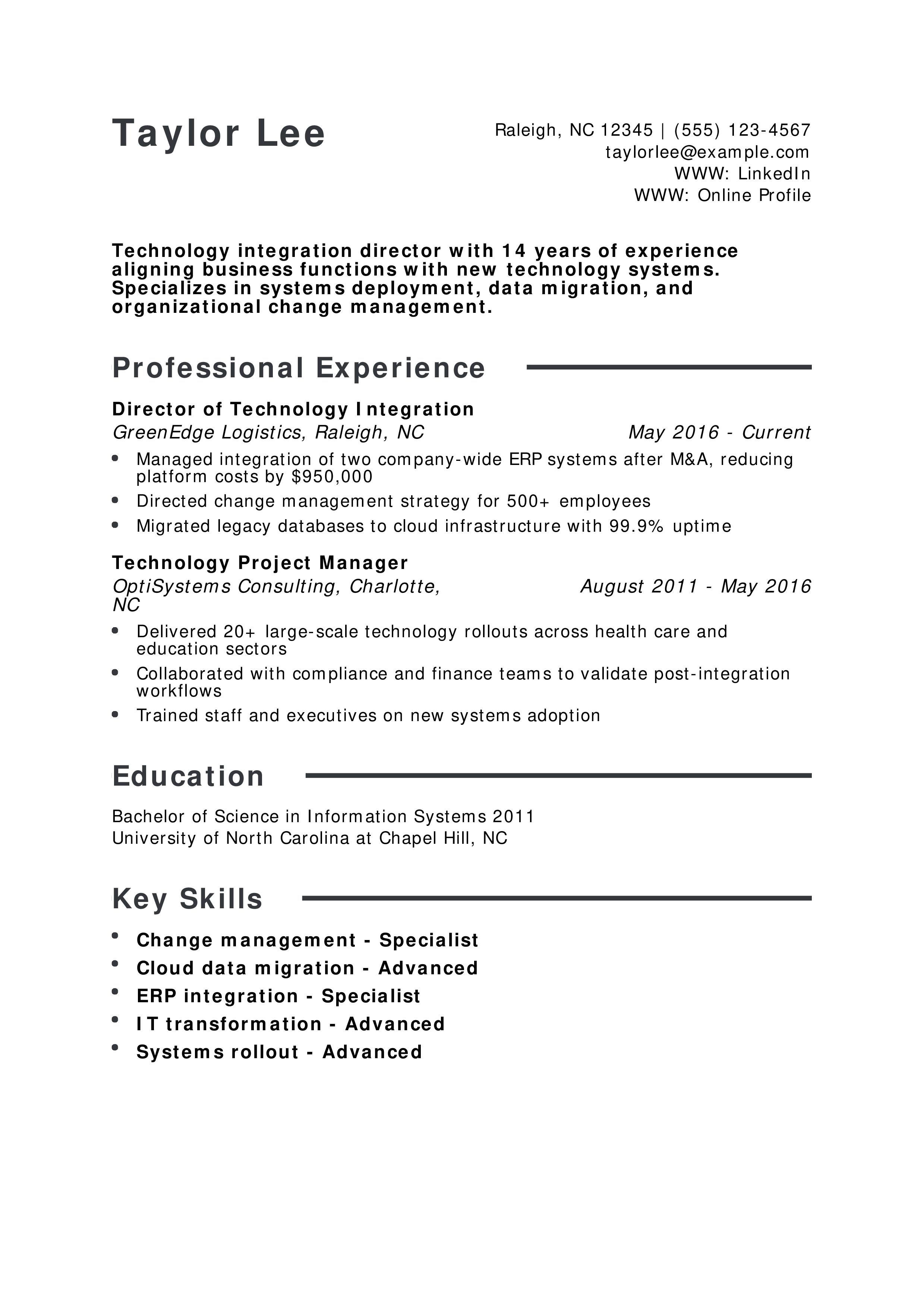
Why This Resume Is Strong
This resume highlights the value of strategic integration and organizational adaptability. Learn how to tailor your resume to complex roles at Resume Summary Examples.
IT Infrastructure Director Resume
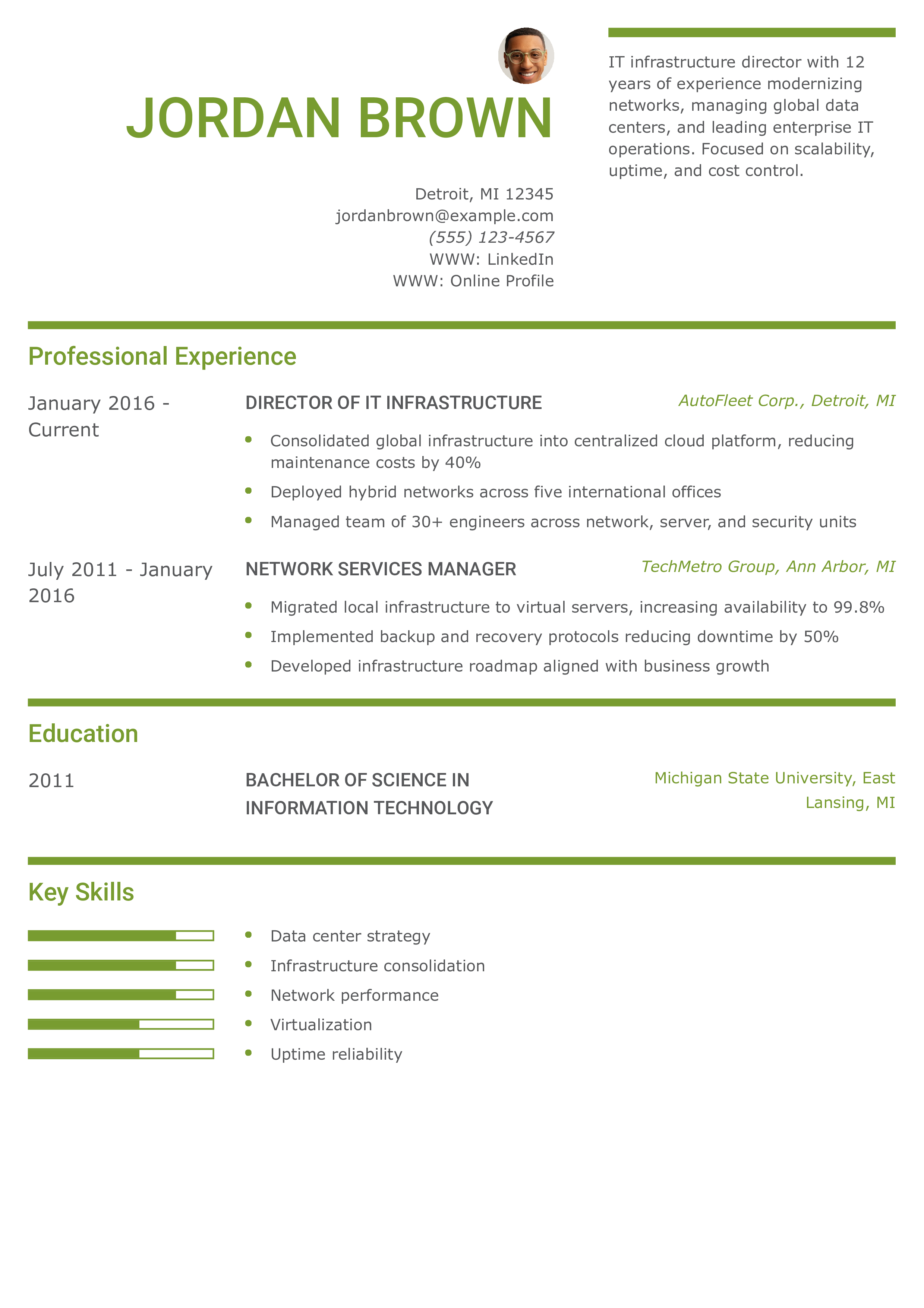
Why This Resume Is Strong
This resume is strong because it connects technical upgrades to measurable uptime and financial improvements. For more advice on choosing the right structure, see Resume Outline Examples.
Technology Portfolio Manager Resume
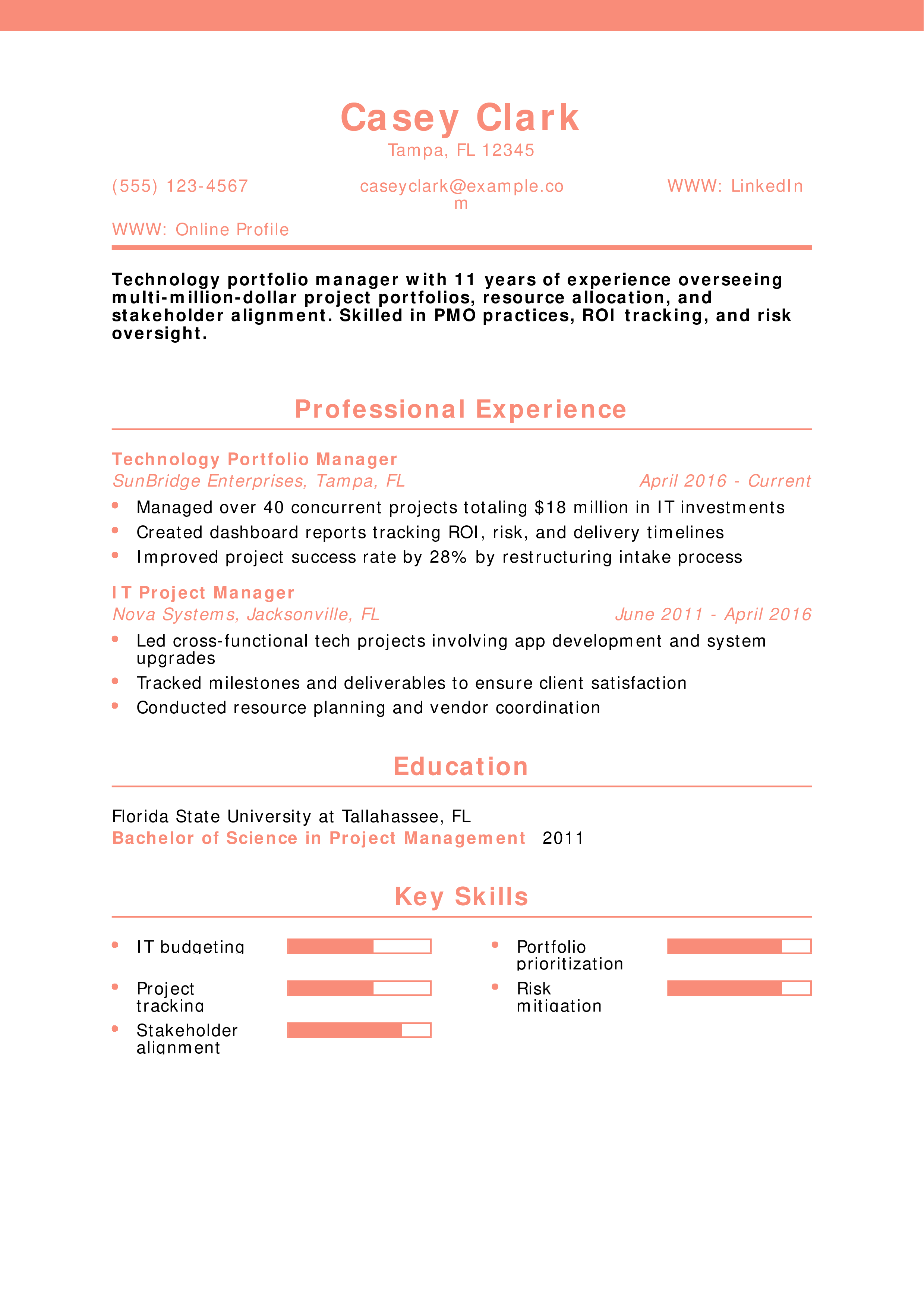
Why This Resume Is Strong
This resume works well because it shows strategic value across multiple projects with clear ROI. Learn what to include for business-aligned roles at What To Put on a Resume.
Chief Information Management Officer Resume

Why This Resume Is Strong
This resume excels by showcasing a long history of leadership in enterprise data strategy. For tips on optimizing experience sections, visit How To List Your Education on a Resume.
Our templates are crafted by professional resume writers to make creating your resume quick, easy, and effective.
- Professional resume template downloads
- Customized cover letter generation
- AI resume writing support
- Career-building resources and advice
Chief Information Officer Text-Only Resume Templates and Examples
How To Write a Chief Information Officer Resume
1. Write a dynamic profile summarizing your chief information qualifications
Your professional profile is often the first thing hiring managers see when they review your job application. To draw the reader in, you’ll need to craft a summary of qualifications that provides a high-level overview of your qualifications and industry achievements. Start by creating a sentence that details your job title, years of experience, and three to four specializations that align with the job posting. Include unique aspects of who you are as a professional to illustrate your personal brand. This approach will help you make a strong first impression on the hiring manager.
Professional Profile - Example #1
Profile
A CIO with over 10 years of experience specializing in cloud computing, enterprise resource planning (ERP), business intelligence, and IT management. A proven track record of leading high-performance cross-functional teams to enhance IT operations. Adept at collaborating with C-level executives to define organizational strategy.
Professional Profile - Example #2
Profile
A results-driven CIO with over 10 years of professional experience specializing in business transformation, change management, executive leadership, and IT strategy. A strong history of leading technology transformations for enterprise organizations. Adept at establishing collaboration and inclusive work cultures to drive success and achieve business objectives.
2. Showcase your chief information experience
Your professional experience section should feature tangible examples of your achievements as a technology executive. As you craft your bullet points, incorporate hard numbers, metrics, and monetary figures to establish a scope for your projects and initiatives. For example, if you played a key role in a major business or technology transformation, emphasize the size of the company and the overall impact on profit and loss. Providing these intricate details is the best way to tell your story and brand yourself as a thought leader within your space.
Professional Experience - Example #1
Chief Information Officer, Enterprise Cloud Corp., New York, NY
June 2016 – present
- Define enterprise vision and technology roadmaps for a cloud-first organization in coordination with C-level executives, manage profit and loss valued at $10 million, and lead the implementation of Agile development methodology across the organization
- Build engineering and business intelligence teams from the ground up, recruit talent, provide mentorship, and establish a work culture centered on accountability
- Identify technology trends, develop overarching strategy, and provide recommendations to senior leadership to enhance the IT organization
Professional Experience - Example #2
Chief Information Officer, Stalwart Insurance Partners, Seattle, WA
June 2016 – present
- Oversee IT operations for a leading insurance company with over $400 million in assets, including IT infrastructure, ERP, and cybersecurity
- Develop technology plans for the development of a new insurance platform to reduce call center volumes by 30% and improve the customer experience
- Coordinate with the vice president of IT, the chief operating officer, and the CEO to plan and execute a company-wide technology transformation to automate business processes, resulting in a $600,000 reduction in operating costs over two years
3. List any education and certifications relevant to chief information
In addition to your education, feature industry certifications to enhance the strength of your job application. Industry credentials are especially important for CIOs, as prospective employers need to see you have the technical and business acumen to succeed in the role. The Certified Information Systems Security Professional (CISSP) and Certified Information Security Manager (CISM) certifications are both particularly important, as each of these credentials covers a broad range of information security topics.
Certifications
Template
- [Certification Name], [Awarding Organization], [Completion Year]
Example
- CISSP, ISC2, 2017 CISM, ISACA 2016
Education
Template
- [Degree Name]
- [School Name], [City, State Abbreviation] [Dates Enrolled]
Example
- Bachelor of Science (B.S.) Information Technology
- University of Pennsylvania, Philadelphia, PA September 2009 – June 2013
4. Make a list of your chief information-related skills and proficiencies
Most companies rely on an applicant tracking system (ATS) to identify qualified candidates for job postings. If your resume lacks key terms, your application may be rejected before it reaches the hiring manager. To mitigate this risk, you’ll need to incorporate a mix of IT and leadership skills that match the job you’re applying for. Below, you’ll find a list of keywords you may encounter while applying for CIO positions:
| Key Skills and Proficiencies | |
|---|---|
| Agile methodology | Business intelligence |
| Business transformation | Change management |
| Cloud computing | Cloud migration |
| Cross-functional collaboration | C-level executives |
| Enterprise software | ERP |
| IT | IT architecture |
| Information Technology Infrastructure Library (ITIL) | IT management |
| IT infrastructure | IT strategy |
| Microsoft Azure | Oracle |
| Organizational development | Process improvement |
| Scrum | Software development |
| Technical project management | Technology transformation |
5. Highlight your leadership capabilities
It’s important to emphasize your leadership skills on your resume. CIOs interface with cross-functional teams, client stakeholders, and the C-suite on a daily basis. Prospective employers want to see you can effectively manage organizations and collaborate with C-level executives. Highlight your ability to collaborate with diverse teams and create high-performance work cultures. Emphasize your ability to translate complex technical requirements into accessible language for stakeholders. This will send a clear message to hiring managers that you’re a qualified candidate and an ideal culture fit for the company.
How To Pick the Best Chief Information Officer Resume Template
When selecting your template, choose a format that is well-structured and organized.
Avoid resume templates cluttered with bulky graphics or use overly flashy colors. Although these elements can be visually appealing, they may distract the hiring manager from your qualifications and work experience. Choose a template that is easy to read and keeps the reader’s focus on your content.
Frequently Asked Questions: Chief Information Officer Resume Examples and Advice
What is the best way to highlight my experience in my Chief Information Officer CV?-
The best way to highlight your experience in your Chief Information Officer CV is by emphasizing specific achievements in each role. Use bullet points to make your experience scannable and focus on results-driven accomplishments, such as improving processes or saving costs. Include quantifiable data like percentage increases or revenue growth to reinforce the impact of your work.
What are common action verbs for chief information officer resumes?-
Using the right action verbs can greatly increase the impact of your bullet points and professional achievements. Many job seekers make the mistake of using passive language, such as “responsible for” or “worked.” This type of framing makes your achievements read like job responsibilities rather than accomplishments. To help you incorporate active language into your resume, we’ve compiled a list of action verbs you can use to craft your professional experience section:
| Action Verbs | |
|---|---|
| Analyzed | Conducted |
| Coordinated | Created |
| Designed | Developed |
| Diagnosed | Drove |
| Enhanced | Evaluated |
| Executed | Generated |
| Identified | Implemented |
| Improved | Led |
| Managed | Oversaw |
| Partnered | Resolved |
| Spearheaded | Supported |
How do you align your resume with a CIO job description?-
According to the Bureau of Labor Statistics, CIO jobs are expected to grow by 16% over the next decade. This equates to over 48,500 new openings every year with average salaries of $159,010. Despite these positive projections, you’ll still need to align your resume with the job description to capitalize on these opportunities. Senior executive positions are highly competitive, and tailoring your document towards individual applications can greatly increase your odds of landing the interview.
For example, if a job posting is seeking a CIO who has a strong background in leading enterprise software implementations, you’d emphasize your experience collaborating with the C-suite to achieve high-level business objectives. If an organization is seeking a technology executive with advanced cybersecurity knowledge, brand yourself as a thought leader by mentioning terms such as cloud security and AI security.
What is the best chief information officer resume format?-
Reverse chronological is the ideal format for CIO resumes. This ensures your most recent and relevant experience is featured towards the top of your document. As a senior executive, it’s important to showcase your career progression and work history using detailed bullet points. For this reason, avoid functional or skill-based resume formats, as this approach won’t provide a framework to tell your unique story within the technology industry.
What’s the recommended length for a chief information officer resume?-
The recommended length for a chief information officer resume is one page, especially for professionals with under 10 years of experience. A two-page resume can work for those with substantial accomplishments or a longer career, but only if it’s concise and highly relevant to the role. Tailoring your resume to the job and highlighting your strongest qualifications are key to success.
Stick to listing work experience from the last 10 to 15 years, as this period is most relevant to employers. Summarize or omit older positions unless they’re crucial for your application. A focused and streamlined resume will help capture the hiring manager’s attention.
Craft your perfect resume in minutes
Get 2x more interviews with Resume Builder. Access Pro Plan features for a limited time!





